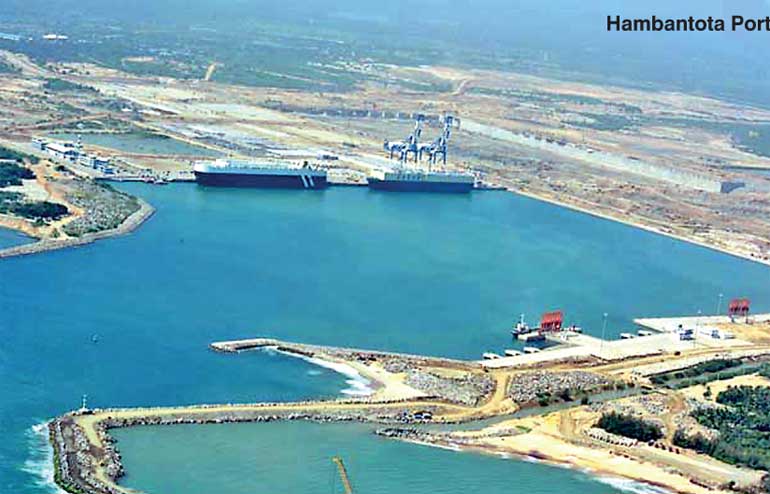Friday Feb 20, 2026
Friday Feb 20, 2026
Tuesday, 13 June 2017 00:05 - - {{hitsCtrl.values.hits}}
The Federation of Chambers of Commerce and Industry of Sri Lanka (FCCISL) yesterday issued the following statement clarifying its stand on the much-discussed Hambantota harbour built with Chinese bank loans amounting to $ 1,265.8 m.
We see the decision taken by Government of Sri Lanka (GOSL) on this matter will be of much significance especially to Sri Lankan industrialists and to the country since it has far-reaching consequences in the political, social and economic spheres of the country.
FCCISL and our member chambers in Sri Lanka have expressed their reservation about the proposed deal whereby Sri Lanka gets only $ 1.120 million for a 99-year period (an average lease income of mere $ 11 million a year).
The previous loan amount received between year 2007 to 2012 was $ 1,265.8 million at the (weighted average) interest cost of 3.07 per annum. The loan repayment together with interest will go on to 2036.
We note that in the proposed plan of leasing this port to a company that is 80 % owned by China, the Hambantota Port has been valued for only $ 1,400 million and the Sri Lankan Government is to receive a loan of $ 1,120 million from the Chinese investor for the proposed 99-year lease. FCCISL is surprised that the following factors were apparently not taking in to consideration in the valuation process:
 Hambantota Port
Hambantota Port
FCCISL finds that the average instalment for a year is in the region of $ 60 to 63 million which has to be within the means of the Government of Sri Lanka (GOSL) which has national debt (76%) as a percentage of GDP. In fact, Sri Lanka’s position is much healthier as opposed to a country like Singapore which has a national debt figure of 104.70 % as a percentage of its GDP. FCCISL is of the view that GOSL can also look to reducing the level of corruption and waste which prevails in an Asian country like ours to improve our financial efficiency.
In the circumstances FCCISL wishes to express its deep concern over the proposed deal with the Chinese investor which does not appear to bring much benefit to this country.
Solutions to the issue: Once again for the interest of readers, we would like to reproduce the suggestions made by our member chamber, the Chamber of Young Lankan Entrepreneurs (COYLE), which drew a considerable amount of interest amongst the Sri Lankan business community and general public:
FCCISL also learns that in China itself there has been a trend to list number of ports in the Shanghai Stock Exchange (SSE), the Shenzhen Stock Exchange (SZE) and the Hong Kong Stock Exchange (HKG). It is important to understand that compared to other countries, China has the highest share of listed port groups in the world!
Measured in share of total throughput per port, an estimated 39% are already listed today and with three major upcoming IPOs, this will increase the Chinese share to about half of the total port market. These Chinese companies are unlike other port group around the world, in that they own a substantial part of not only the general port infrastructure, but also the terminal operations in their respective ports. In 2011, the listed port groups reported an asset base in excess of one quarter trillion RMB.
In this context why can’t Sri Lanka too adopt such a strategy without entrusting a massive asset to another company of foreign origin?
The another matter now being discussed among the business community is the company which is to strike a deal with Sri Lanka is a provincial government company with a lesser rating than State company under the Central Government of China.
FCCISL also sees lack of strategic thinking on the part of the GOSL. The importance of strategic location of the Hambantota Port will naturally be increased after the proposed ‘Kra Canel’ which is to be built through Thailand, as a joint investment with China. This new project will make the sailing time much faster from South China Sea to Indian Ocean. Once built, all ships will have better options and will naturally seek the better logistics available from Hambantota harbour and avoid the Singapore harbour.
The other issue related to port agreement is the leasing of 15,000 acres of land to the Chinese company. FCCISL sees that releasing of such a vast land would have far-reaching consequences due to social resentment resulting in removal from their traditional agricultural homelands for the proposed development.
In these circumstances, FCCISL being the apex body of the chamber movement in Sri Lanka, wishes to fervently request both Minister of Port and Shipping Mahinda Samarasinghe and Minister of International Development Strategies and International Trade Malik Samarawickrama to reconsider Sri Lanka’s stand on the proposed deal in a much more favourable manner to bring greater value to Sri Lanka.